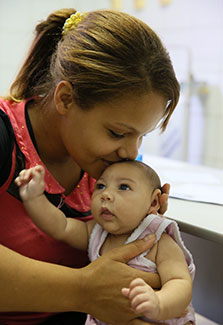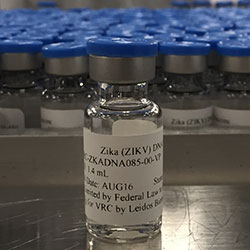
Zika vaccine trial site in Peru led by Fogarty trainee
May 9, 2017

Photo by Harold Ruiz/PAHO-WHO
NIAID is leading the trial of an
experimental Zika vaccine, which could
help prevent birth defects that can result
from infection during pregnancy.
experimental Zika vaccine, which could
help prevent birth defects that can result
from infection during pregnancy.
A former Fogarty trainee who conducts research in the Peruvian Amazon is part of a multi-site NIH trial to evaluate a Zika vaccine candidate. The experimental DNA vaccine, designed to protect against disease caused by Zika infection, was developed by scientists at NIH's National Institute of Allergy and Infectious Diseases (NIAID).
"A safe and effective vaccine is urgently needed to prevent the often-devastating birth defects that can result from Zika virus infection during pregnancy," says NIAID Director Dr. Anthony S. Fauci. "Evidence also is accumulating that Zika can cause a variety of health problems in adults as well."
The vaccine is being tested at 11 sites in the U.S., Central and South America where active mosquito-transmitted Zika infection is confirmed or projected. Dr. Martin Casapia is the principal investigator at the site in Iquitos, Peru, a jungle city of nearly 440,000 people.
As a specialist in infectious diseases and tropical medicine, Casapia complemented his medical degree with Fogarty training that he says had a profound impact on his career and his country's ability to participate in international research collaborations.

Vial of NIAID Zika virus vaccine

Photos courtesy of NIAID
A healthy volunteer receives the
NIAID Zika virus investigational
DNA vaccine as part of an early-
stage trial to test the vaccine's
safety and effectiveness.
NIAID Zika virus investigational
DNA vaccine as part of an early-
stage trial to test the vaccine's
safety and effectiveness.
"The Fogarty training was, for me, the most important experience of my career as an investigator," he says. Casapia was a scholar in Fogarty's AIDS International Training and Research Program (AITRP) at the University of Washington (UW), where he earned a Master of Public Health degree.
Casapia entered the program in 2005 while working at a hospital in Iquitos. He wanted to obtain advanced skills to conduct studies to better treat, prevent and control infectious diseases in the region. Those diseases include malaria, dengue, HIV, intestinal parasites and now Zika.
"I learned all the steps for designing, implementing and conducting an investigation, including tools of biostatistics and epidemiology," he explains.
"Right from the get-go, you need to have a very robust understanding of epidemiology to be able to design and implement a clinical trial," says Dr. Carey Farquhar, who directed the UW program in which Casapia participated and was herself a Fogarty trainee. "You need someone with that kind of depth and exposure to the best training available to then go back and be a leader."
Since his training, Casapia has been involved in numerous epidemiological studies and major international clinical trials and has contributed to nearly 50 scientific papers published in international journals.
Casapia leads the medical team at a nonprofit in Iquitos that is dedicated to clinical scientific research, La Asociación Civil Selva Amazónica (the Amazon Forest Civil Association). It is a trial site for two longstanding international research collaborations funded by the NIH, the HIV Prevention Trials Network (HPTN) and the HIV Vaccine Trials Network. Casapia has been an investigator on several of the trials and currently co-chairs an HIV vaccine study.
Now, he's applying that experience to NIH's Phase 2 Zika vaccine trial, which NIAID Director Fauci describes as "a significant milestone in our efforts to develop countermeasures for a pandemic in progress."
The trial, announced in March, consists of two studies. Part A will further evaluate the vaccine's safety and ability to stimulate an immune response in participants, and assesses the optimal dose for administration. Part B will attempt to determine if the vaccine can effectively prevent disease caused by Zika infection. The Peru site is involved in Part B.
The fact that a small country like Peru can participate in international research, and contribute scientific evidence toward eliminating and controlling infectious diseases such as Zika and HIV demonstrates the value of research training, Casapia says.
"We need to do research globally if we're going to continue to advance a research agenda that is very relevant for the United States because we can't find all the answers to all the questions just within our U.S. populations," adds Farquhar. "What Martin is doing with the clinical trial in Peru, many, many other Fogarty trainees are doing in other ways."
And he's proof the multiplier effect training can have. Casapia is preparing future generations of infectious diseases specialists by coordinating a master's degree program at a university in the Peruvian Amazon and serving as a mentor to U.S. students working in Peru.
More Information
- Phase 2 Zika vaccine trial begins in U.S., Central and South America
NIAID/NIH news, March 31, 2017 - Zika virus research news, information, resources and funding from Fogarty
To view Adobe PDF files, download current, free accessible plug-ins from Adobe's website.






















.png)











No hay comentarios:
Publicar un comentario